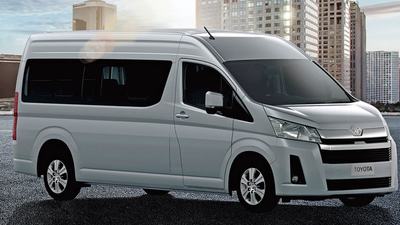Toyota Provides Medical Facility with Transport Vehicle for Seriously Ill COVID-19 Patients
Toyota City, Japan, Apr 30, 2020 - Toyota Motor Corporation (Toyota) announced that today it provided Showa University Hospital a specially designed transport vehicle for seriously ill COVID-19 patients. The Toyota Hiace-based vehicle was developed and outfitted by Toyota Auto Body Co., Ltd. based on a variety of requests from medical facilities. This is the first time for Toyota to provide a transport vehicle for seriously ill COVID-19 patients.
The specially designed, Hiace-based transport vehicle for seriously ill COVID-19 patients was developed as an "airborne droplet circulation control vehicle." It features an interior barrier that creates a forward compartment, which houses the driver's seat and front-passenger seat, and a rearward compartment, which houses the rear passenger seat area. An exhaust fan continuously expels air from the rearward compartment out of the vehicle, helping to prevent the air in the rearward compartment from circulating to the forward compartment.
With a desire to provide vehicles that can at least play a small role in combatting COVID-19, Toyota, while listening to the needs of those on the frontlines of the medical sector, has been considering the best ways it can help. The transport vehicle for seriously ill COVID-19 patients provided today joins 11 transport vehicles for mildly infected patients already provided by the Toyota Group to such entities as medical facilities and local governments.
The Toyota Group has positioned this initiative for supporting the around-the-clock efforts of the frontlines of the medical sector, which are working hard to diagnose and treat patients for COVID-19, as part of Toyota's Kokoro Hakobu Project(3). Going forward, in response to requests from such entities as medical facilities and local governments for the provision of transport vehicles for COVID-19 patients, Toyota intends to continue considering measures that will be helpful and to continue taking quick action.
(1) So that the vehicles provided can be of use to the hospitals most in need, vehicle use is being coordinated by parties on the medical frontlines based on vehicle-use status and other factors. (Primary receivers of vehicles: Showa University Hospital, Nippon Medical School Hospital, Center Hospital of the National Center for Global Health and Medicine, The Jikei University Hospital, Tokyo Shinagawa Hospital, and Nihon University Itabashi Hospital)
(2) Vehicle provided by Toyota sales companies in Chiba Prefecture based on technological cooperation from Toyota Motor Corporation
(3) The Kokoro Hakobu Project (with "Kokoro Hakobu" meaning "to carry or deliver one's heart" in Japanese) has been the collective name of nationwide initiatives by Toyota, Toyota sales outlets in Japan, and their employees to provide continuous and long-term support to disaster-affected areas in the wake of the Great East Japan Earthquake. The name has the connotation of "carrying you in our hearts." Based on Toyota's desire to contribute in some way to people who have contracted and are suffering from COVID-19, as well as to the medical professionals, Japan's central government, and local governments in Japan fighting the disease night and day, Toyota has decided to apply "The Kokoro Hakobu Project" as its overall moniker for related support activities conducted by Toyota Group companies working together.
About Toyota Motor Corporation
Toyota Motor Corporation (TMC) is the global mobility company that introduced the Prius hybrid-electric car in 1997 and the first mass-produced fuel cell sedan, Mirai, in 2014. Headquartered in Toyota City, Japan, Toyota has been making cars since 1937. Today, Toyota proudly employs 370,000 employees in communities around the world. Together, they build around 10 million vehicles per year in 29 countries, from mainstream cars and premium vehicles to mini-vehicles and commercial trucks, and sell them in more than 170 countries under the brands Toyota, Lexus, Daihatsu and Hino. For more information, please visit www.toyota-global.com.



